Do Pickles Have Calories?
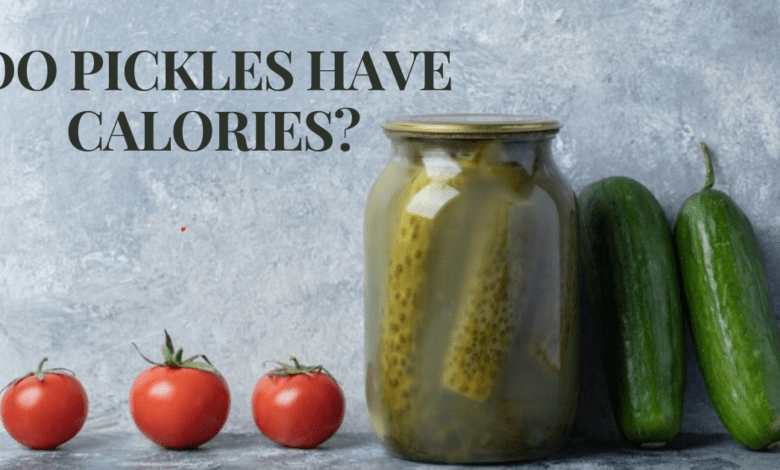
Pickles are a popular snack and topping because they are sour and crunchy. But if you’re trying to eat healthy, you might ask: do pickles have calories? Let’s find out more about pickles and if they are good for you.
What Are Pickles?
Pickles are cucumbers that have been preserved in a brine solution that typically includes vinegar, salt, and various seasonings. There are many different sorts of pickles, each with their own flavor and texture. Popular pickle kinds include dill, sweet, bread and butter, and kosher.
Calories in Different Types of Pickles
Dill Pickles
Dill pickles are a traditional favorite, recognized for their strong, acidic flavor. A single medium dill pickle comprises only 4 calories, making it an extremely low-calorie snack option.
Sweet Pickles
Sweet pickles, as the name implies, have a sweet flavor. Because of the additional sugar, they contain slightly more calories than dill pickles. A medium sweet pickle contains about 30 calories.
Bread and Butter Pickles
Bread and butter pickles are sweet and tangy and commonly served on sandwiches. They have similar calorie content to sweet pickles, with approximately 35 calories per medium pickle.
Kosher Pickles
Kosher pickles, which follow Jewish dietary regulations, are often garlic-flavored and low in calories. A medium kosher dill pickle contains around 4 calories, just like ordinary dill pickles.
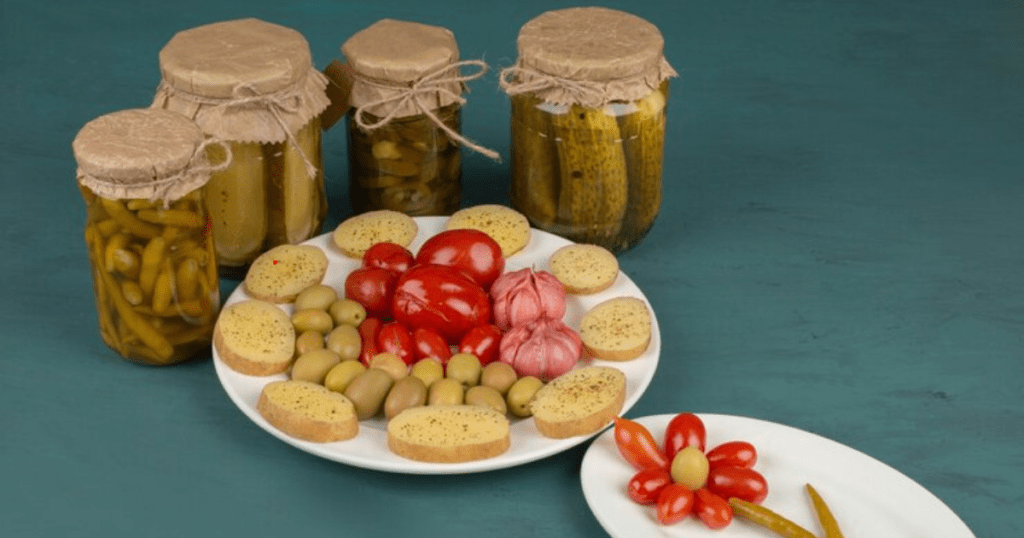
Nutritional Content of Pickles
Macronutrients
Pickles are low in calories, protein, and fat. The carbohydrate amount varies, especially in sweetened variants, but it is normally minimal.
Micronutrients
Pickles include a minor amount of vitamins and minerals. They can provide a good amount of vitamin K, which is required for blood clotting and bone health. Pickles also include trace levels of vitamins A, C, and calcium.
Sodium Content
One distinguishing feature of pickles is their high salt content. A single medium dill pickle can contain up to 800 milligrams of sodium, which is approximately 35% of the daily recommended amount. This is a crucial factor for anyone watching their salt consumption.
How Many Calories Do Pickles Have?
Pickles are quite low in calories. On average, a medium-sized dill pickle (around 35 grams) contains 4-5 calories. Pickles are a popular snack for folks limiting their calorie intake because they contain little calories. However, the exact calorie content may differ slightly depending on the type of pickle and any other components used in the pickled process.
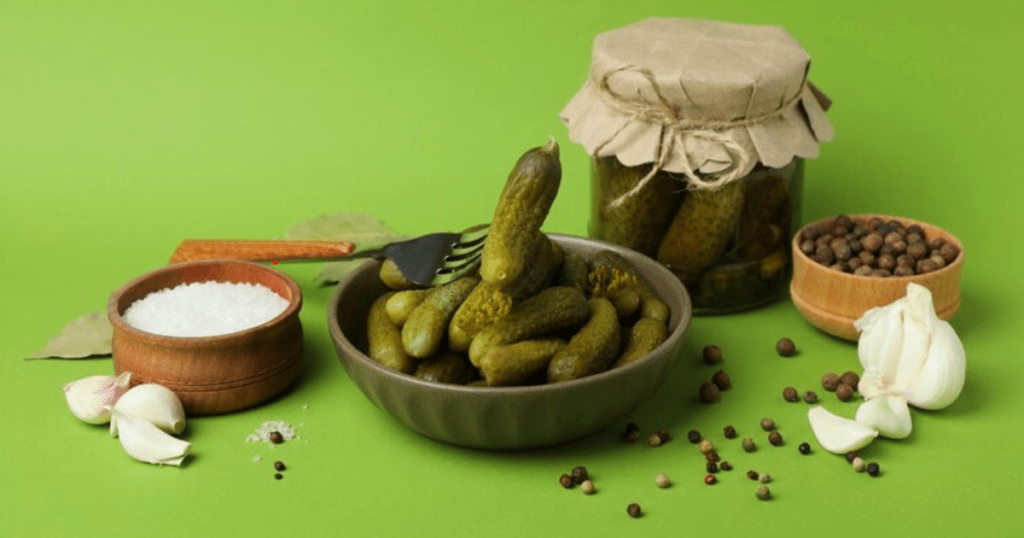
Health Benefits of Pickles
Pickles provide numerous health benefits in addition to their low calorie content, making them an important part of a well-balanced diet. Here are several important health benefits:
- Probiotics: Fermented pickles, such as those made using lactic acid fermentation, contain helpful microorganisms known as probiotics. Probiotics support a healthy gut flora, which aids digestion and strengthens the immune system.
- Antioxidants: Pickles include antioxidants, which help fight oxidative stress and inflammation in the body. These antioxidants are derived from cucumbers as well as any other spices and herbs.
- Hydration: Pickles, with their high water content, can help you stay hydrated, especially in hot weather or after a workout.
- Blood Sugar Control: According to some research, vinegar in pickles may help regulate blood sugar levels by enhancing insulin sensitivity and lowering blood sugar increases following meals.
- Electrolyte Balance: The salt in pickles can help maintain electrolyte balance, which is essential for nerve function and muscular contraction, particularly in athletes and individuals who sweat excessively.
- Hunger Control: Pickles’ strong flavor can help suppress hunger and lessen cravings for other high-calorie, unhealthy snacks.
- Vitamins and Minerals: Pickles include critical vitamins and minerals, including vitamin K, which is required for blood clotting and bone health. They also include trace levels of vitamins A, C, and potassium.
Are Pickles Good for Weight Loss?
Yes, pickles can help you lose weight if eaten in moderation. Here are a few reasons why.
- Low in Calories: Pickles are low in calories, making them an excellent snack choice for people wanting to lower their calorie intake.
- High in Fiber: Pickles are high in fiber, which can help you feel full and satisfied while perhaps lowering your overall calorie intake.
- Low in Fat: Pickles are essentially fat-free, which can help you cut down on your overall fat intake.
- Crunchy and Flavorful: Pickles’ crunch and sour flavor might help fulfill cravings for salty and crunchy snacks without the high calorie content of chips.
- Hydration: Pickles contain a lot of water, which might help you stay hydrated and full.
However, it’s worth noting that pickles are heavy in salt. Excess sodium intake can cause water retention and other health concerns. Therefore, while pickles can be a good addition to a weight loss diet, they should be consumed in moderation and balanced with other low-sodium items.
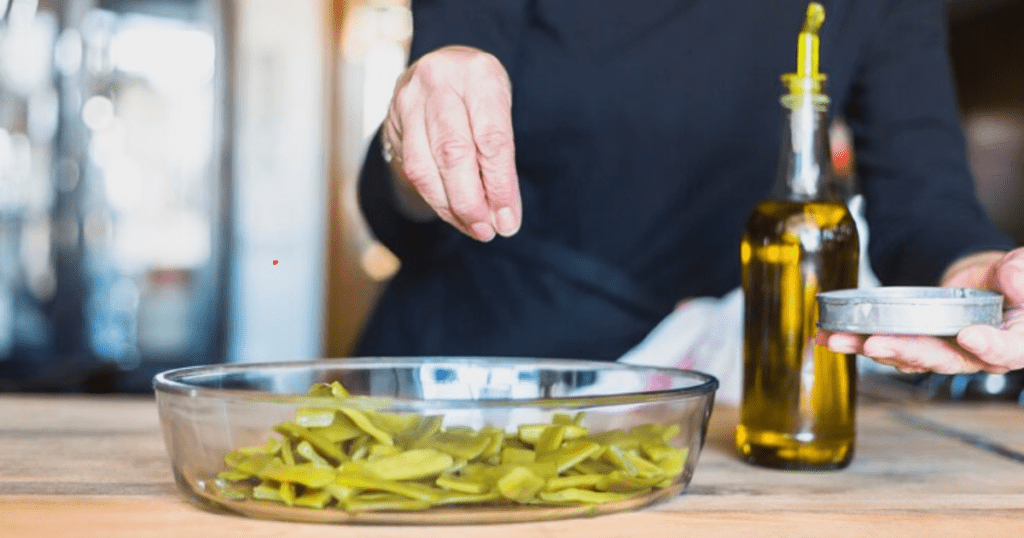
Potential Drawbacks of Pickles
While pickles have numerous health benefits, there are some negatives to consider, particularly when ingested in excess:
- High Sodium Content: Pickles are often high in sodium, which can lead to high blood pressure, fluid retention, and an increased risk of heart disease and stroke if ingested in excess.
- Acidity: The vinegar and other acidic chemicals in pickles might induce acid reflux or heartburn in certain people, particularly those who are prone to gastrointestinal problems.
- Added Sugars: Some pickles, particularly sweet ones, contain added sugars. Excessive sugar consumption can cause weight gain, blood sugar fluctuations, and other health problems.
- Dental Health: The acidity in pickles can erode tooth enamel over time, potentially leading to dental problems if pickles are consumed frequently.
- Potential Allergens: Some pickling processes involve spices or ingredients that could be allergens for certain individuals. If you are allergic to certain foods, always verify the ingredients.
- Preservatives and Additives: Some people prefer to avoid commercially produced pickles because they contain preservatives, artificial colors, and other additives.
- Digestive Problems: For some people, pickles’ high acidity and salt content might cause digestive discomfort, bloating, or gas.
Read More: Lemon and Cucumber Water Benefits & How to Make It
Conclusion
Pickles are crunchy and taste tangy, which makes them fun to eat. Pickles don’t have many calories, so they are good if you want a light snack and don’t want to gain weight. But be careful because they have a lot of salt. It’s a good idea to pick the ones that fit your diet best. You can eat pickles by themselves or with other food, and they give you a special mix of taste and health benefits.
People Also Ask
1. Do pickles have calories?
Yes, pickles have calories, but not too many. Most pickles are made with cucumbers, which are low in calories. When cucumbers are converted into pickles, they are soaked in a mixture of water, vinegar, and spices. This process adds very few calories, so a typical pickle may contain only 5-10 calories.
2. Are pickles a healthy snack?
Pickles can be considered a healthy snack because they are low in calories and include vitamins and minerals. However, they might be heavy in sodium (salt), which is bad for you if consumed in excess. So, while pickles can be beneficial to a balanced diet, they should be used in moderation.
3. Can eating pickles help me lose weight?
Eating pickles by itself will not help you lose weight, but because they are low in calories, they can be an excellent snack if you are attempting to eat less calories overall. Just remember to watch the salt content and consume a variety of other nutritious foods.
4. Why do pickles taste sour?
Pickles taste sour because they’re marinated in vinegar, an acid. Vinegar gives pickles their sour flavor. Sugar is often added to sweet pickles, but they still have a sour flavor from the vinegar.
5. Are all pickles the same?
No, not every pickle is the same! There are numerous varieties of pickles, including dill pickles, sweet pickles, bread & butter pickles, and even hot pickles. They all have distinct flavors and components, but the majority of them are still low in calories. If you want to know the actual calorie count and ingredients, just check the label.

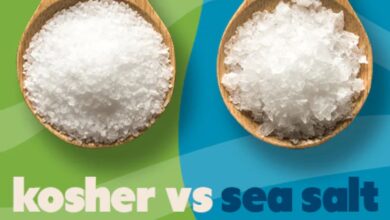



Its excellent as your other content : D, thankyou for putting up. “The art of love … is largely the art of persistence.” by Albert Ellis.